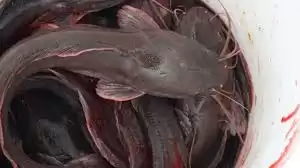Catfish Farming Training on the Cards
Over 100 fish farmers in Zimbabwe will undergo training in catfish production to help grow the sector. The training will be facilitated by the Fisheries and Aquaculture Resources Department in partnership with WorldFish. The program aims to diversify fish production and expand the sector.
More than 100 fish farmers are set to undergo training in catfish production this month as part of a program facilitated by the Fisheries and Aquaculture Resources Department (FARD). The Government has been focused on developing the sector by expanding tilapia fish production through dam-stocking initiatives and the development of village-based fishponds. Now, in partnership with WorldFish, an international aquaculture research and innovation organization, the program is expanding to include catfish production.
FARD director, Mr. Milton Makumbe, expressed his belief that the training program will help grow the sector. The program, which will take place from September 18 to 22, will include training for breeders, farmers, and feed millers. Additionally, a directory will be developed to connect value chain actors with the private sector.
Under the theme "Exploiting Aquatic Species Diversity for a Transformed Fisheries and Aquaculture Sector," the three-day training program will be implemented as part of the Technical Assistance for Agricultural Transformation Project. This project, supported by WorldFish, aims to harness technology for the growth of the sector. The project will focus on capacity development and technical assistance activities in aquaculture development.
Participants in the training program will have the opportunity to learn about improved fish-rearing technology in the cage culture system and the use of crop residues for the production of quality, low-cost fish feed. Half of the trainees will be youths and women, as the program aims to promote inclusivity and diversity in the sector.
Mr. John Kapfunde, a Mutoko farmer who will be participating in the training program, expressed his motivation for diversifying his fish farming operations. He currently focuses on tilapia, but has noticed an increasing demand for catfish from his customers. Recognizing the potential market, he believes that diversifying his operations will allow him to meet these demands and expand his business.
Mr. Mark Tsabora, a Mudzi district agricultural extension officer, emphasized the importance of diversification in aquaculture. He stated that catfish is favored for its tender meat and flavor, indicating that there is already a market for it. However, farmers need to adopt good management practices in order to maximize their produce. Tsabora stressed that fish farming is a business and that implementing good agronomic practices is crucial for success.
The catfish farming training will be conducted at the Henderson Fisheries Unit. Zimbabwe has seen a steady increase in annual fish production in recent years, rising from 15,000 tonnes to nearly 20,000 tonnes. However, the country requires approximately 30,000 tonnes of fish annually. To meet this demand, the Government plans to increase fish production to 40,000 tonnes by 2025.











Comments on Catfish Farming Training on the Cards